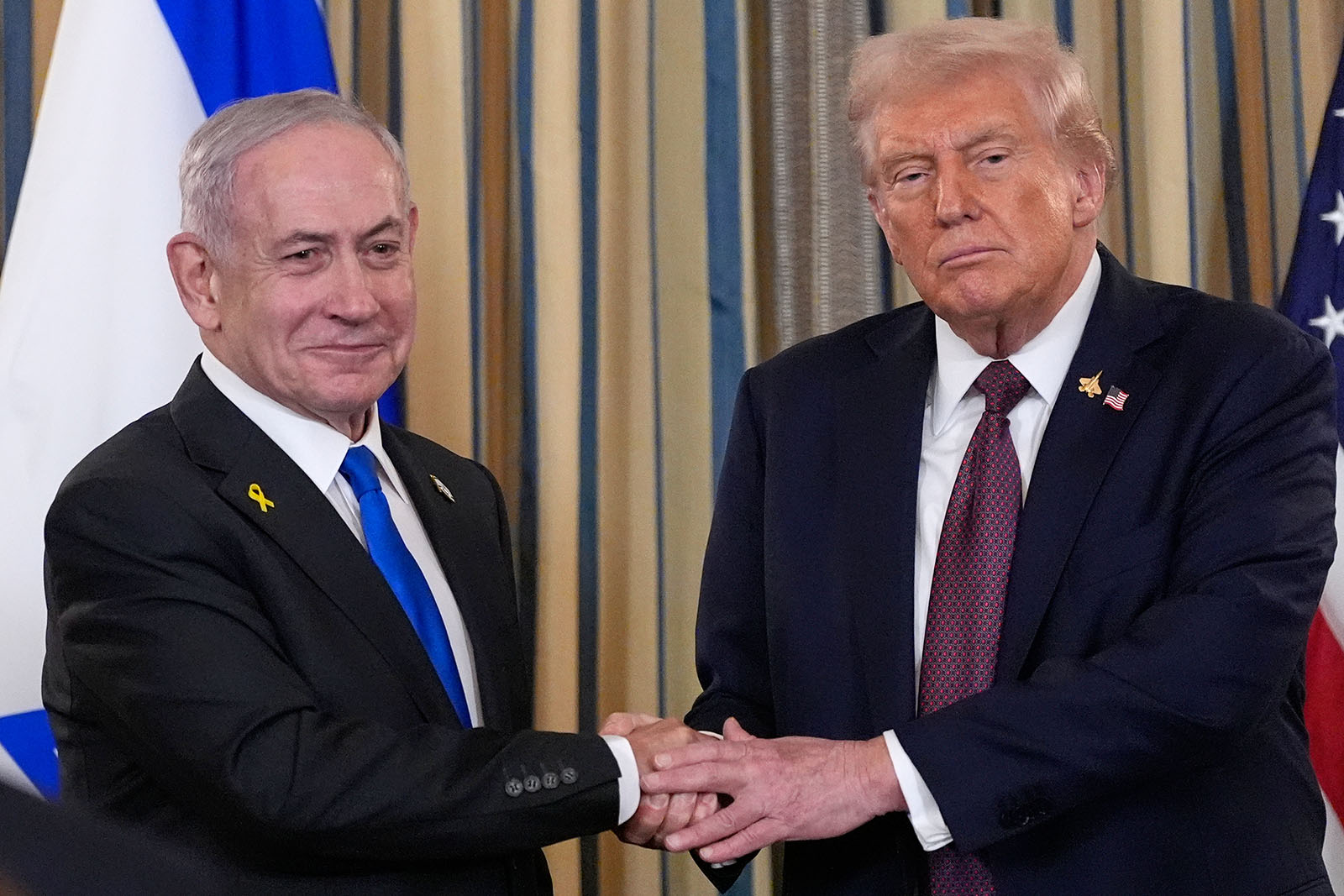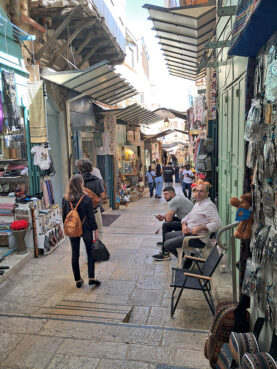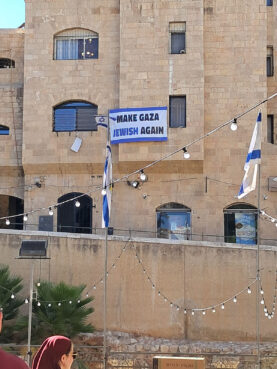
JERUSALEM (RNS) — Dia, a middle-aged Muslim man who owns a shop in the Arab Quarter of the Old City of Jerusalem, dreams of the day large numbers of tourists and pilgrims will return to the ancient-walled city. He longs for a time when they will buy enough colorful scarves, jewelry and Christian keepsakes that he can afford to feed his family.
Although in theory he supports any realistic solution to the Hamas-Israel war — including the peace plan proposed by President Donald Trump on Monday (Sept. 29) — he told RNS he doubts Hamas and the Israeli government will mutually agree to every point, including the full disarmament of all Palestinian militias and the eventual full withdrawal of all Israeli troops from Gaza.
“We pray for peace, but I don’t believe Trump’s peace deal will stop the war. People are too entrenched in their positions,” said Dia, who like others in the multicultured Old City declined to be identified using their last names, saying they feared Israeli or Palestinian officials would punish them for comments in media outlets or on social media.
“It’s been a horrible two years — my shop is earning just 4 to 5% of what it earned before Oct. 7,” said Dia, referring to the day in 2023 when thousands of Hamas militants breached Israel’s border and carried out a massacre. “Sometimes three days go by, sometimes an entire week, without a single sale,” he added, as mostly Jewish Israelis hurriedly made their way through the alleyway to the Jewish Quarter and the Western Wall the day before Yom Kippur.

Shopkeepers in the Arab Quarter of the Old City of Jerusalem hope the peace deal proposed by President Donald Trump will bring an end to the two-year Israel-Hamas war. (Photo by Michele Chabin)
After two years of war, many Israelis yearn for peace, the return of the hostages and normalcy — or what passes for it in the volatile Middle East. In a poll conducted immediately after Trump’s White House press conference Monday with Israeli Prime Minister Benjamin Netanyahu, 71% of Israelis surveyed — and 93% of Arab citizens of Israel who answered the poll — said they supported the peace plan. However, just 12% said the plan has a high probability of succeeding. Conducted Sept. 29-30 by researchers from the Agam Institute and the Hebrew University of Jerusalem, the study surveyed 847 Israelis over age 18 from a range of populations, with a margin of error of 4.2 percentage points.
The plan to end the war would also require releasing all the remaining hostages held by Hamas — which would lose government control. Israel would release 250 prisoners and 1,700 Gazans who were detained after the war began, including women and children. And humanitarian aid would be sent into Gaza as the territory is reconstructed. The Palestinian Authority would eventually run Gaza after a transitional period under international control.
On Tuesday, Trump said Hamas has “three or four days” to respond to the proposal and that “Hamas is either going to be doing it or not, and if it’s not, it’s going to be a very sad end.” Even if Hamas rejects the plan — which it indicated it will, but has not formally responded — pundits argued the terror group will try to negotiate a more favorable deal given the pressure exerted by Trump and several Arab countries.
Although Netanyahu agreed to the peace plan, The Times of Israel reported his right-wing government will vote only on the release of hostages in exchange for Palestinian prisoners held in Israel, but not on the peace deal as a whole out of fears that his far-right-wing coalition partners will reject the deal.
Far-right-wing politicians want Israel to permanently rule Gaza and to reestablish the Israeli settlements it uprooted in 2005. Two years later, Hamas overthrew its rival, Fatah, and increased its attacks on Israeli border communities.

A sign saying “Make Gaza Jewish Again” hangs from a residential building in the Jewish Quarter of the Old City of Jerusalem. Some Israelis believe that Israel should reestablish the settlements and military bases it uprooted from Gaza in 2005. (Photo by Michele Chabin)
Today, most Israelis believe Hamas would have been less capable of carrying out its Oct. 7, 2023, massacre that started the war if Israel had not withdrawn its troops and settlements from Gaza 20 years ago. In a poll released Aug. 1, conducted by the Israeli research institute Maagar Mochot for the Israel Hayom newspaper, 56% of Israeli respondents said that, in retrospect, the disengagement increased the likelihood of a major terror attack, while 76% said withdrawal was an error.
A sign reading “Make Gaza Jewish Again” was displayed on a residential building in the Jewish Quarter of the Old City, an area inhabited by several thousand Orthodox Jews.
In a Jewish Quarter gift shop, Michal, a Jewish saleswoman in her 20s who immigrated to Israel from Europe a year ago, appeared pensive when asked if she believed the Trump deal can succeed.
“Do I think it will be a success? I really hope it will be a success, but we’ve heard that a ceasefire was coming many times before, and every time we’ve been disappointed,” she said. “I’m sure that Arabs have been disappointed as well.”
Michal said she moved to Israel, even in the midst of the war, due to rising antisemitism in her home country “and because I wanted to come to contribute to Israeli society and keep it safe.” Though she has no regrets, she said that “whenever I take a bus, the bus stops are plastered with the images of hostages and soldiers who have been killed. We are constantly confronted with pain.”
Asked about the proposed peace deal, a senior Arab Christian man who works in the Old City declined to share even his first name because his views are critical of Hamas, he told RNS.
“Hamas started this war, and the people of Gaza are suffering,” he said. “The Hamas people hiding in the tunnels don’t care about the people living above ground. I would be lying if I said that Hamas is prepared to hand over its weapons. But like everyone here, I can hope.”
